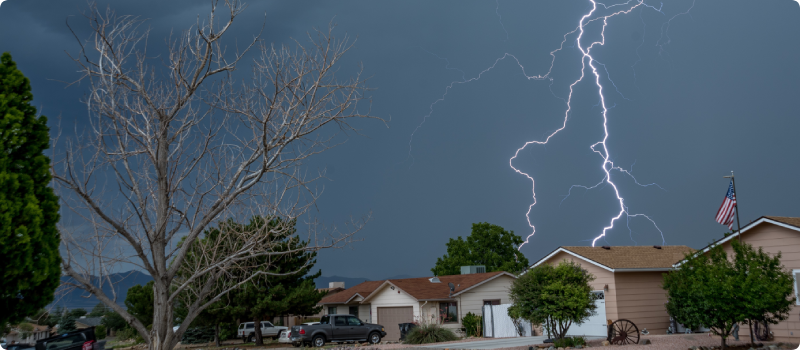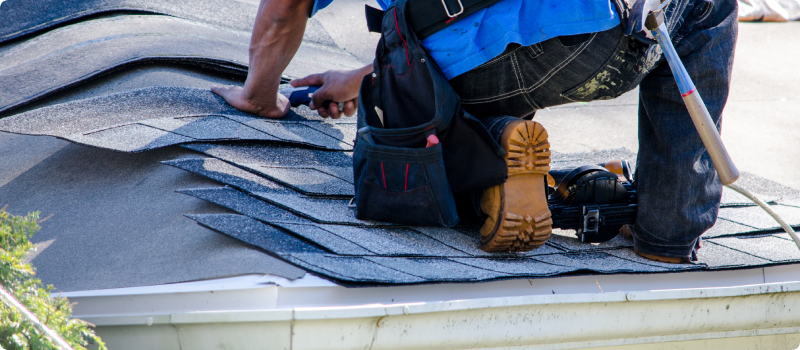
Does insurance cover lightning damage?
Updated February 29, 2024 . AmFam Team
Your homeowners insurance covers damage from lightning strikes — but only for certain types. To properly protect yourself from damages caused by lightning, it’s important to know just how your homeowners insurance covers you. We’re here to help clear things up — because when it comes to things you worry about, we want to help keep you fearless,
Did you know, according to National Geographic, lightning is so hot that just a flash of it can heat the air around it to temperatures five times hotter than the sun’s surface? Or that cloud-to-ground lightning bolts are so common that about 100 strike the Earth’s surface every single second? And in 2018, the Insurance Information Institute reported $909 million in lightning claims were paid out to almost 78,000 policyholders around the U.S.
From causing a fire to ruining expensive electronics, lightning can cause serious damage. Let’s take a closer look at how your homeowners insurance can help cover you for lightning damage.

How do insurance companies assess lightning damage?
How your insurance company will assess lightning damage depends on your specific insurer and the type of damage that was done. We’ll walk you through how it commonly works.
Lightning strikes can cause fires inside or outside your home, ruin expensive appliances and electronics, damage wiring in the walls, and potentially shock and injure you or someone in your household. The good news is lightning is covered by almost all homeowners insurance policies. Your policy includes coverage for things like:
Damage to personal property. If your personal property, like appliances or electronics, is damaged from lightning, you’ll typically be reimbursed for the actual cash value — which is what you’d pay for a similar item today taking depreciation into account. You should have the option to add replacement cost coverage, which would pay what it’d cost to replace your personal property at its current value.
Damage to other structures, like a garage or shed. If your covered outbuilding is damaged by lightning, it should be covered by your homeowners policy.
Additional living expenses. If your home was damaged due to lightning and is being repaired or rebuilt, your home insurance covers the cost of living elsewhere, like a hotel, and other extra expenses while your home is uninhabitable.

There are a number of ways lightning is classified. Here’s a close look at each.
Lightning strikes home
If a lightning strike makes its way through your home or property while it passes from the atmosphere to the ground, this is considered a lightning strike — and is usually what causes the most damage. Among other things, strikes can cause fires or charring, so these types of claims are typically easy to collect since evidence of damage is clear.
Close call lightning strike
When lightning strikes near your home but doesn’t hit it directly, this is considered a close-call lightning strike, or near miss. In these cases, the damage is usually less, making it more difficult for your insurer to conclude the cause of damage.
Lightning strikes trees on property
If lightning strikes a tree on your property, a number of things can happen. Not only could it cause the tree to fall, but the strike could cause the tree to fall and crush anything in its path. In instances like these, your insurance would normally cover not only the cost to remove the tree from your property, but the cost to repair or replace any damaged property, like a fence or your roof. You’ll need to prove that the tree fell on the fence due to the lightning strike, so make sure to take pictures of any damage before the tree is removed. If possible, see if your insurance company will send an adjuster to visit your property before the tree is removed.
Ground surge
A ground surge occurs when a lightning strike causes a significant electricity spike throughout a given area. This is one of the most common lightning-related claims filed, but also a difficult one to prove. If you are filing a claim for damage related to a ground surge caused by lightning, your insurer will typically look to see if there was lightning in the area during the date and time you provided.
You may want to consider adding equipment breakdown coverage to your policy. Your base policy covers lightning damage, as well as damage from artificially generated electrical currents. However, if you have equipment breakdown coverage, lightning is still covered by your base policy, but power surge damage is covered by equipment breakdown coverage, which has no per item internal limits and a lower deductible.

Lightning strike insurance claim process
Follow our tips for filing a lightning strike insurance claim:
1. Assess the damage. As soon as it’s safe to do so, take a look at the damage. The insurance claims adjuster will need to know what damage you’re claiming occurred, so be thorough, take photos and write down everything that happened, including the date and time of the incident.
2. File a claim with your insurance provider. At American Family Insurance, you can file your claim online, by contacting your agent, or by calling 1-800-MYAMFAM (1-800-692-6326). You can also file through MyAccount or the MyAmFam app. Your company will send an adjuster to your property to assess the damage.
3. Consider your deductible. You’ll likely have to pay a deductible before your insurance covers the cost. If the cost to repair the damages is more than your deductible, you can choose to continue with the claims process and your adjuster will work with the insurance company to determine a settlement for repairs.
4. Get paid. Once your claim has been accepted, you’ll usually receive your payment in two increments — the first check to begin repairs and the second after the repairs are completed. You also may be offered a settlement on the spot. You can choose to accept the check right away and reopen the claim later to file for an additional amount.

Lightning strike safety and protection tips
Taking proactive steps to protect your home from lightning is a smart move as a homeowner. Simple safety measures can go a long way. Here are a few tips to implement to protect yourself and your home from lightning:
- Make sure your smoke detectors are working. Place fire extinguishers around your home so in the event lightning strikes and starts a fire, you’re prepared.
- Get surge protectors for your most valuable appliances and electronics — or unplug them.
- Stay indoors if there is thunder and lightning. Keep in mind, lightning strikes are most common on late summer afternoons and evenings.
Connect with an American Family agent to ensure your homeowners coverage is set up to protect your home from lightning damage.
This article is for informational purposes only and based on information that is widely available. We do not make any guarantees or promise any results based on this information.
This information represents only a brief description of coverages, is not part of your policy, and is not a promise or guarantee of coverage. If there is any conflict between this information and your policy, the provisions of the policy will prevail. Insurance policy terms and conditions may apply. Exclusions may apply to policies, endorsements, or riders. Coverage may vary by state and may be subject to change. Some products are not available in every state. Please read your policy and contact your agent for assistance.

